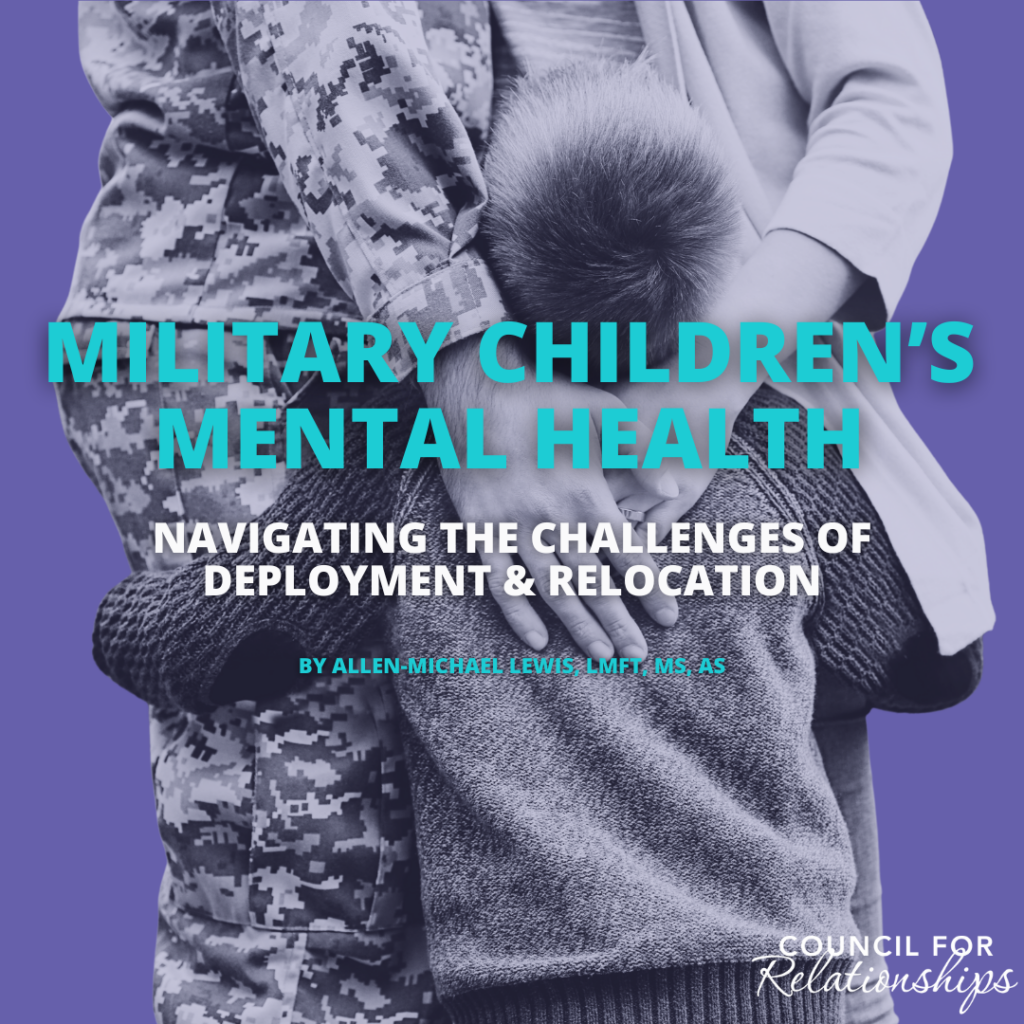Military Children Mental Health: Navigating the Challenges of Deployment & Relocation
Nicole’s father has been on active duty in the Army for most of her life. He has had several deployments, and their family moved multiple times, bringing them to different duty stations during her childhood and teenage years. When people discuss the military, they often focus on active-duty and veteran service members, but they usually leave out military children and families. This oversight can have a significant impact on military children’s mental health as they face unique challenges and adjustments: “Children of active-duty military members often get overlooked.”

Request a therapy appointment today.
Understanding Military Children’s Mental Health
Nicole’s experience shows that military life changes the person in the military and their family in ways that might affect the service member. The impact of these changes on military children’s mental health can be significant.
How Deployments Affect Military Children’s Mental Health
“There are times when a parent is gone for an entire year,” Nicole shared, “and then when they come back, everything is different, and the family needs to adjust to the new changes again.”
According to the United States Department of Defense, there are about 2,077,630 members in the United States Armed Services. This number represents enlisted members, and each service member has children, partners, and families connected to them. Like Nicole, about 1.6 million military children are part of these families. While their experiences differ, many of them go through the ups and downs of military life, which often affects military children’s mental health.
“The first time my dad deployed, I was only six months old, and he didn’t come back until I was one year old,” Nicole explained.
The Impact of Frequent Moves on Military Children’s Mental Health
During deployments, military children experience a wide range of emotions, and it’s a big transition for everyone involved. Nicole’s father deployed every couple of years, and she says that after so many deployments, she didn’t feel much when told he was leaving again because it became “just the norm” for her.
Besides deployments, military families move on average every 2 to 3 years, according to the Department of Defense. These moves affect military children, who must change schools and rebuild support networks with each new move. These constant changes can take a toll on military children’s mental health. “It was difficult making friends when we had to move a lot, and because I was so young,” Nicole explained, “it was hard to keep in touch with people.”
Throughout her father’s career, there were times when Nicole moved back to a duty station where they had been stationed before. Still, she found it hard to reconnect with friends she had previously made there. Each move to a new duty station changed their connection to family and community support.
Nicole’s family was often stationed far from their relatives, so Nicole and her mom were at home when her father deployed. Nicole explained, “[her mother] took on the role of, I would say, ‘single parent’ while my dad was gone. We didn’t live near our family, so it was just the two of us.”
Supporting Military Children’s Mental Health During Transitions
This is a reality for many military families, and that’s why building a community wherever they are, even if just for a few years, is crucial because this experience can feel isolating.
Building Community for Better Mental Health
Around military bases and outposts, communities often have programs and support to help military families build connections at each duty station, which can positively impact military children’s mental health.
Reconnecting After Deployments: A Key to Mental Well-being
Despite the challenges of military life, Nicole can point out some positives. She remembers when her father would return from deployment and bring her gifts from his travels. Even though he had been far away, she felt that he still thought about her, which was evident in the gifts he brought.
While the transition back from deployment was hard, and Nicole says it was sometimes difficult for her and her father to connect, she shared that her parents made it a point to create opportunities over dinner for all three of them to reconnect and talk about their lives.
Programs That Support Military Children’s Mental Health
We can support families transitioning back from deployment through our Operation Home & Healing (OHH) program at Council for Relationships.
How Operation Home & Healing Helps Military Families
While Nicole’s family reconnected at the dinner table, having a space where you can navigate complex feelings and different experiences can be much-needed support, especially when addressing military children’s mental health.
Finding the Right Support for Military Children
It can be hard to understand a service member’s experiences and those of their family, especially the children because their emotions can be complex. When we look at Nicole’s experience, we see the importance of remembering the military child’s experience. If you or someone you know is a service member, take the time to check in with the military children in your life.
Little intentional acts can go a long way in helping military children feel more connected and supported as they navigate these complex emotions. At Council for Relationships, we also support military children and their families. To learn more about our programs, please contact us at 215-382-6680 or click here to contact OHH services.
About Operation Home & Healing
Operation Home & Healing (OHH) offers specialized counseling for active-duty service members, veterans, and their families to help them heal and strengthen their relationships. The program provides therapy tailored to military culture and offers services on a sliding fee scale. Contact Allen-Michael Lewis to learn more.
For more details, you can visit the Operation Home & Healing webpage.
About Philadelphia Therapist Allen-Michael Lewis, LMFT, MS, AS
Allen-Michael Lewis, LMFT, MS, AS, is the Senior Director of Clinical Programs and licensed Marriage & Family Therapist at Council for Relationships.
If you are in Pennsylvania seeking therapy, consider contacting Allen. Whether you prefer in-person sessions at our University City Philadelphia offices or the convenience of online therapy, Allen is here to support you on your journey.
Please visit his CFR profile for more information or to schedule an appointment with Allen-Michael Lewis. You can also request a therapy appointment with one of our 85 other therapists.
If this is an emergency, please call 911 or contact the National Suicide Prevention Lifeline by dialing 988.
More Expert Voices Mental Health Blogs from Council for Relationships
CFR’s therapists, psychiatrists, and mental health experts have so much more to share! Dive into the CFR Expert Voices blog for insightful advice on topics like how to help children of military members during a new move, understanding family dynamics, using attachment theory in therapy, improving relationships, and more. Want to stay in the loop? Join the mailing list for first access to our latest blogs and expert insights!
If you found this blog on the systemic approach to relationships helpful, explore more great content on the CFR Expert Voices blog:

